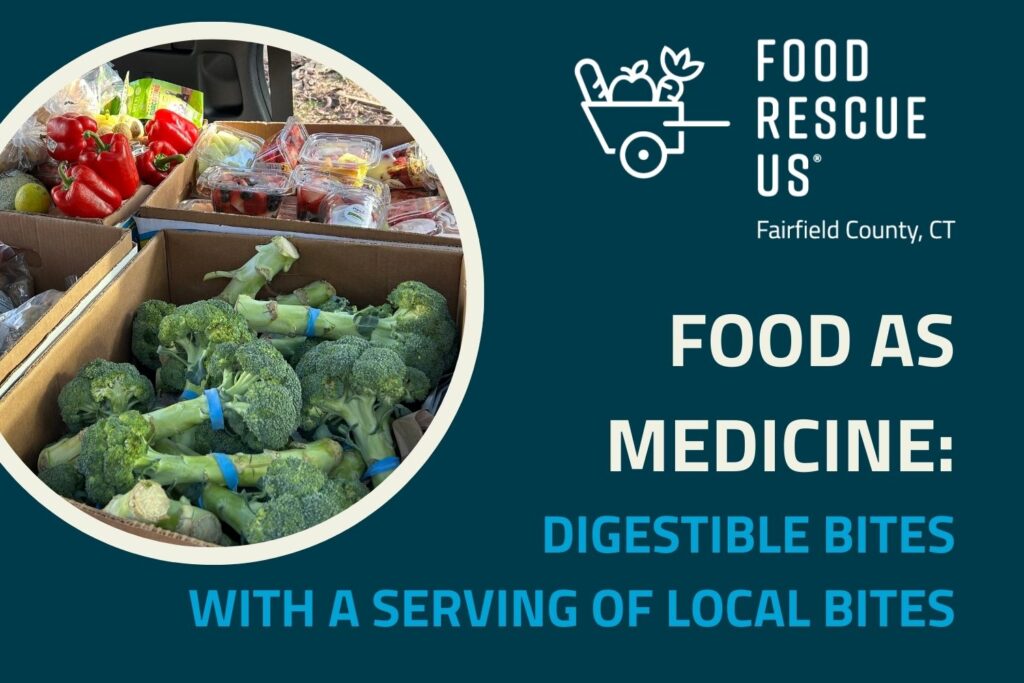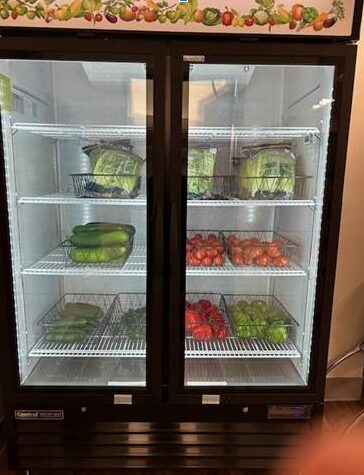FOOD AS MEDICINE: DIGESTIBLE BITES (WITH A SERVING OF LOCAL BITES) – MARCH 2024
Each month, we cull through all of the “food as medicine” news to highlight the most recent and exciting developments in the field for Digestible Bites. This month, we’re highlighting standout local organizations and people who promote food as medicine in our community.
Food as Medicine News – The shorter version:

- Meals made with fresh, whole foods could transform our healthcare system
- Over half of Stockton, California’s residents are diabetic or prediabetic. A prescribed meal program aims to change that.
- The Project Food Box program provides medically tailored food boxes to clients of California’s MediCal insurance program.
- And, in our Local Bites section: the Charlotte Hungerford Hospital’s recently opened “Food4Health” clinic is designed like a mini-grocery store offering fresh fruit, vegetables, and other healthy items for patients with chronic diseases where nutrition is an important key in management.
Food As Medicine News – The longer version:
Meals made with fresh, whole foods could transform our healthcare system
Congressman James P. McGovern (D-MA), the Chairman of the Committee on Rules, founder and co-chair of the House Hunger Caucus, and sits on the House Subcommittee on Nutrition, says that even though, “research shows better diets can prevent and even reverse chronic illness, saving billions of dollars and helping countless patients… the science is light-years ahead of the public policy on this issue. Instead of acknowledging the link between poor nutrition and chronic illness, federal programs like Medicare often incentivize costly treatments and expensive prescription drugs.”
McGovern has introduced a new bipartisan bill in Congress with Debbie Stabenow (D-Michigan), officially called the Medically Tailored Home-Delivered Meals Demonstration Pilot Act. “It relies on a simple idea: Caregivers should be able to provide nutritious, dietitian-approved meals directly to the homes of seniors with chronic health conditions. It’s that simple.”
Over half of Stockton, California’s residents are diabetic or prediabetic. A prescribed meal program aims to change that.
Over half of Stockton, California’s 320,000 residents are diabetic or prediabetic, according to the Public Health Institute. “The Healthy Food Rx program aims to help change that, recognizing the large body of research linking food insecurity and diabetes. So far, the approach — delivering meal kits with enough food for two meals and pantry staples, paired with nutrition fact sheets and cooking lessons — appears promising in managing diabetes…Along with addressing the sharp rates of diabetes in Stockton, a larger goal of the program is to build the case for a program like this to be treated as medicine.”
A study of 450 program participants found a clinically significant decrease in A1C levels (which measures the percentage of your red blood cells that have sugar-coated hemoglobin) — an average 0.8 percent decline — within 12 months for participants with uncontrolled diabetes. The study participants also reported that the dietary shifts helped them exercise and take health education classes more often.
The Project Food Box program provides medically tailored food boxes to clients of California’s MediCal insurance program.
As an outgrowth of the USDA’s pandemic-era Farmers to Families Food Box program, the Project Food Box program of SunTerra seized on the inefficiencies to direct low-cost produce to food banks. “Reluctant to drop Farmers to Families when Covid funding dried up, the most recent iteration of the program, SunTerra, provides medically tailored food boxes to clients of California’s MediCal insurance program. Steve Brazeel, Founder and CEO of SunTerra Produce, is showing that there is a role for farmers to play in the Food is Medicine.”
California residents enrolled in Medi-Cal, the state’s Medicaid healthcare program, can fill out a form requesting regular deliveries of medically tailored grocery boxes. They must include their Medi-Cal identification number and list the chronic diseases that afflict them. Via phone, one of the team’s registered dieticians confirms an applicant’s eligibility and learns more about their chronic illnesses, their relationship to food, and any cultural food preferences.
Since its founding in 2020, Project FoodBox has delivered over five million boxes of fresh fruits and vegetables to families in need through its network of healthcare companies, food banks, faith-based organizations and nonprofits.
Local BitesFun
Opened in December 2023, the Charlotte Hungerford Hospital’s new “Food4Health” clinic is designed like a mini-grocery store offering fresh fruit, vegetables, and other healthy items for patients with chronic diseases where nutrition is an important key in management. Falling under the umbrella of the Hartford Hospital’s “Food4Health” program, the Charlotte Hungerford’s Food4Health’s Director, Registered Dietitian Carla Angevine, is very hopeful.

Referred patients who suffer from high risk chronic health conditions, like diabetes, heart disease, and obesity, are given a “prescription” to access the Food4Health clinic once a week for six months to “shop” for fruits, veggies, and healthy foods for them and their families (the patients are not charged for the food).
On the first visit, the staff reviews the patient’s prescription with the patient, helps them set goals, and helps them shops for the food their doctor has recommended. At minimum, the patients must visit the clinic two times a month to ensure the consistency necessary to see improvements with their condition.
Not only can patients shop for items on their grocery list but the staff will also point out and educate the patients about new foods and offer recipes. The staff even note if the patients are avoiding specific foods and try to understand why. Angevine says, “We get to know our patients, strike up conversations, build trust, and, most importantly, build relationships.”
Food4Health’s grocery store offers fresh produce, whole grains, whole grain cereal, low sodium canned goods, olive oil, vinegar, and spices. “As we get into the growing season, we will order more from our local Food Hub.” The Northwest Connecticut FoodHub works with farmers all over northwest Connecticut picking up their fresh, locally grown produce, and delivering it to food pantries (as donations) and wholesale customers, such as schools, grocery stores, restaurants, and now hospitals like Charlotte Hungerford (we profiled the Northwest Connecticut FoodHub and it’s founder Renee Girous in this blog nearly a year ago).
“It’s really important people understand how much food insecurity affects your health. People with food insecurity, often because of access and transportation issues, are typically limited to low-nutrient and calorie-dense foods, which may result in chronic diseases like obesity and diabetes,” said Angevine.
Beyond helping patients in their six months with the clinic (which they can renew to one year), the program also helps them transition out of the program. “If they are not on SNAP, we help them apply. We make sure to have a discussion on how to best utilize their dollars to incorporate the healthy foods they need.”
Despite just beginning, Angevine is very hopeful. “My hope is through the program, as a patient’s health is improved they will have increased economic opportunities that will in return improve their food security status.”
